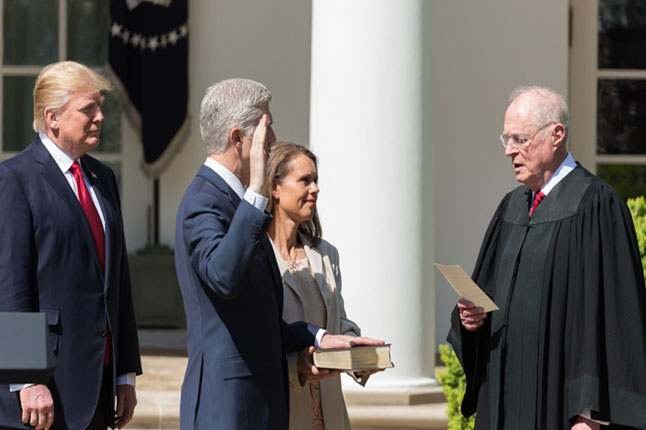
Justice Anthony Kennedy’s June 27 announcement that he will retire from the U.S. Supreme Court at the end of July has left little doubt that his eventual replacement appointed by President Donald Trump will push the court further to the right. As of press time, Trump has not yet announced a nominee. And there has been much talk that a conservative majority could spell the end of long-standing precedents for hot-button issues such as abortion rights and affirmative action.
But the outright overturning of precedents such as Roe v. Wade or Obergefell v. Hodges is likely not as imminent as varying interest groups want. A push for narrow rulings and limiting the Supreme Court’s role as a political pawn, both intended to preserve it as an institution, have been hallmarks of the Roberts Court. And experts say that’s likely to keep the court from gutting long-established precedents outright. It’s more likely, they posit, that the court will chip away at left-leaning decisions over time.
“I guess the question is, is Chief Justice Roberts going to put institutional concerns ahead and say, ‘We don’t want to overturn these long-standing precedents outright on a 5-4 vote,’” said Sean Connelly, an appellate lawyer and former Colorado Court of Appeals judge.
A few cases from the most recent term showing Roberts’ hand in limited decisions are Masterpiece Cakeshop v. Colorado Civil Rights Commission and Gill v. Whitford. In the latter, Wisconsin-based case, the court declined to address the case’s biggest question of when political districting maps subject to partisan gerrymandering violate the Constitution. Roberts wrote the plaintiffs had not shown the Wisconsin legislature’s actions individually hurt them, and that the court did not have proper jurisdiction over the case. The case was remanded to the district court.
When the court ruled last month in Janus v. AFSCME to overturn Abood v. Detroit Board of Education, a 1977 precedent regarding agency fees charged by public-sector unions, Justice Elena Kagan wrote a strong rebuke of the majority’s decision. The Abood decision had been a workable compromise, she wrote, and that there have been no recent developments to justify overturning it. She deemed the Janus decision a troubling instance of “judicial disruption.”
Connelly said while he believes marriage equality could be the controversial issue likely to survive a hard-right Supreme Court majority, affirmative action plans will likely be one of the first major issues to go.
His prediction about affirmative action may prove correct. On Tuesday, officials announced the Trump administration would encourage school superintendents and college presidents not to consider race in their admissions standards. The announcement reverses an Obama-era policy that asked universities to consider race in order to increase diversity on campuses.
And there is already a high-profile case that could challenge a recent precedent on affirmative action. In 2015, The U.S. Supreme Court upheld the constitutionality of considering race in undergraduate admissions if the policy stands up to strict scrutiny in Fisher v. University of Texas at Austin. Students for Fair Admissions v. Harvard, filed in federal district court in Boston, alleges Harvard systematically excludes Asian-American students from admission in order to free up spots for students of other races. Upon the Trump administration’s announcement, experts told the New York Times the lawsuit is part of a broader conservative effort dismantle affirmative action.
CROSSING PARTY LINES
But even with a conservative majority, it wouldn’t be unthinkable for some surprise left-leaning decisions to come out of the Supreme Court. The conservative justices have on occasion crossed party lines, but they’ve done it for reasons still in line with their right-leaning jurisprudence.
In writing the 2013 majority opinion for Alleyne v. United States, Justice Clarence Thomas showed opposition to mandatory minimum sentences not because they disadvantage minorities, but because they interfere with an individual’s Sixth Amendment right to a jury trial. And this term in Sessions v. Dimaya, Justice Neil Gorsuch wrote a concurring majority opinion striking down a provision of the Immigration and Nationality Act that calls for deportation of an individual convicted of an aggravated felony, which includes in its definition “a crime of violence.” The meaning of a crime of violence, Gorsuch wrote, is too vaguely defined to be constitutional.
University of Colorado law professor Scott Skinner-Thompson said he could envision Roberts upholding anti-discrimination laws in cases that may come up similar to Masterpiece Cakeshop v. Colorado Civil Rights Commission. In his concurrence, Roberts noted his belief that anti-discrimination laws are as a general principle consistent with the Constitution, and exceptions must be construed narrowly.
Roberts’ dissent to the court establishing marriage equality nationwide in Obergefell v. Hodges addressed his concern that it was anti-democratic, because it took control away from state and local governments.
“If he’s true to his commitment to federalism and local control over these issues, then that would suggest that he votes to uphold LGBT anti-discrimination ordinances that have been passed,” Skinner-Thompson said.
In 2012, Roberts provided the swing vote to uphold the Affordable Care Act. He determined the argument that Congress’s power to levy taxes could justify the law’s requirement for most Americans to have health insurance or else pay a tax penalty passed enough muster to save the law.
But Roberts’ concern to preserve the court as an institution must balance with his consistently conservative bent, and Connelly said the Janus case provides clues to the dynamics of a hard-line conservative majority once Kennedy is replaced.
“I think there’s a lot of hints in the Abood case that was overturned in Janus,” he said. “It was done on a 5-4 vote, and I think that’s one that institutionally, the chief justice in theory would be least likely to join. … But he did that in Janus, and I think something even more prominent in terms of Roe [v. Wade], it’s something that’s certainly possible.”
—Julia Cardi

